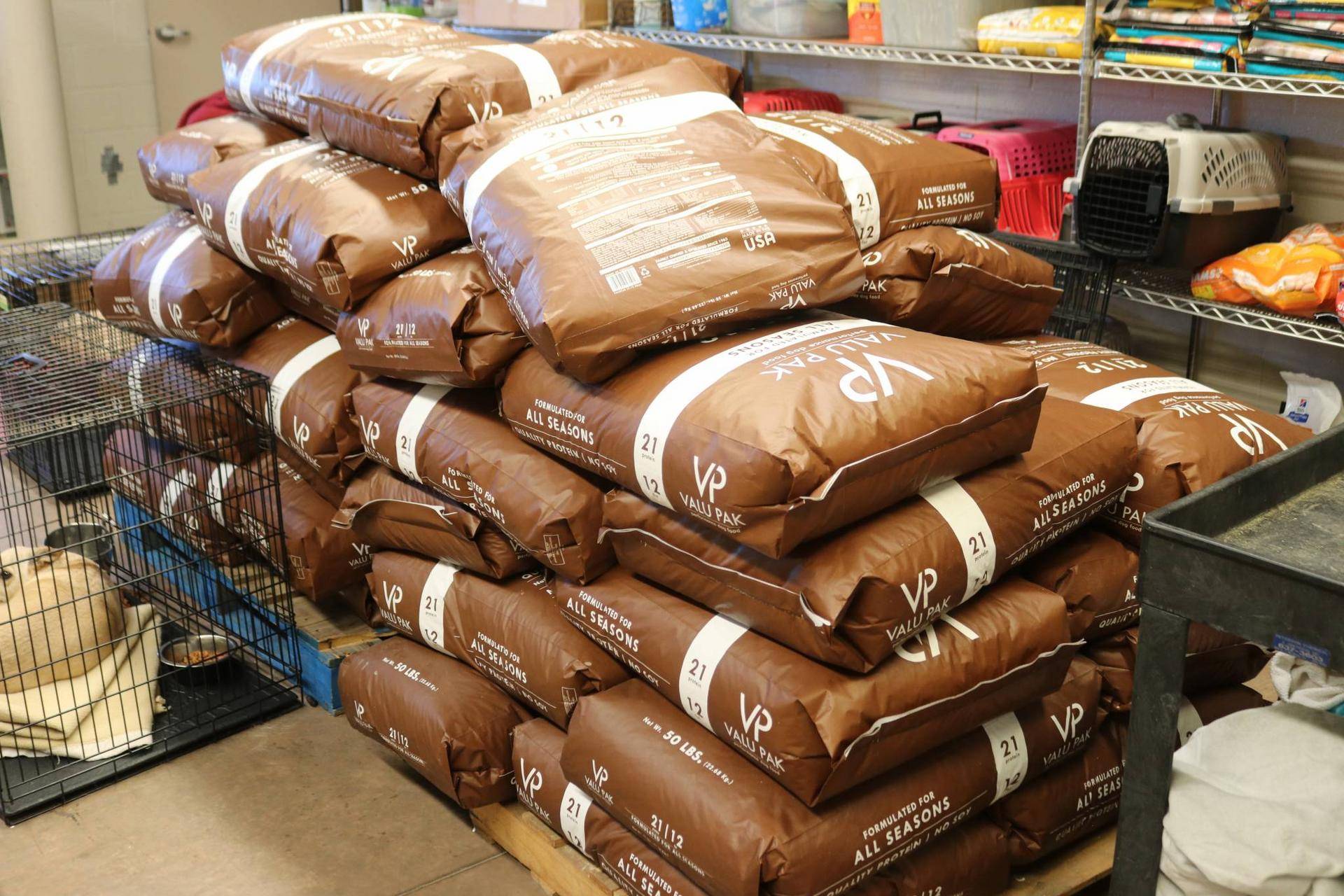On Dec. 14, a letter was released to the public from Dr. Dan Harmer of Castle Country Vet regarding alleged abuse at the Carbon County Animal Shelter. On Dec. 15, Carbon County Sheriff Jeff Wood, Wellington Police Chief Tom Kosmack and Sgt. Rick Adams presented a tour of the shelter and gave a response.
Kosmack explained that he operates a kennel and competes with his dogs, which is something that he has done for about 30 years. Kosmack ships in a high-quality dog food by the semi-load from Memphis, Tennessee to sell. The food, ValuPak, can fit 40 of the 50-pound bags per pallet and showcases the protein, fat and other nutritional values, as well as how much dogs should be fed.
Sgt. Rick Adams took over the responsibility of the animal shelter in the spring and, according to Sherriff Wood, has been very hands-on, visiting at least once per week to keep an eye on things. In doing so, Sgt. Adams noticed what was described as a definite waste of food.
It was reported that large bowls of food would be topped off each morning, stacked on a cart and distributed to the dogs, no matter their size. The employees would then return in the afternoon to take the bowls and would throw out whatever food happened to be left. Noticing the waste, an initiative began to change the way that the dogs are fed. In the beginning of November, Kosmack was asked to visit the shelter and administer some training. The ValuPak bags give a guidance on the size or breed of the dog and how much they should be eating.
The main takeaway from Kosmack’s visit was to evaluate food amounts by dog and raise the level or lower the level by a 1/2 cup or cup size, depending on if the dog needed more food or less. Sheriff Wood stated that what it came down to was that at the end of the day, food shouldn’t be wasted. There is currently a large amount of donated food for the animals as well, and there is a feeding schedule detailing how many times per day and what amounts each animal should receive.
“Somehow, that was taken as only feeding a cup of food a day,” said Sheriff Wood. “I don’t know where that came from, we never said that.”
With that in mind, Sheriff Wood wished to give a history of what has transpired throughout the course of the year. He reported that there was an outbreak from feral cats that ended up getting all of the cats within the shelter sick. The shelter asked Dr. Harmer to visit on the cat side and he helped them through that process. There was then complaints that the shelter was unsanitary, and Sheriff Wood stated that they did everything to make sure it was clean and began improving cleaning efforts.
The dog in question in Harmer’s letter was brought to the shelter in early October as a stray and was already struggling with its health when it arrived, the sheriff stated. The dog did not seem to be getting better and about a week after that, began to have stomach issues and diarrhea in the kennel to the point that it was destroying the kennel. On Nov. 29, a feces sample was taken to Dr. Harmer’s office, where it was determined not to have a parasite. The dog was taken to Dr. Harmer’s office the following day and he has had the dog ever since, the sheriff said.
Sheriff Wood also wished to address a number of other things within the doctor’s letter. “The fact that he says he did pro-bono work for the shelter is 100% false,” the sheriff stated.
In 2021, the total expenditures on veterinary services for the shelter was $6,300. This was prior to Dr. Harmer being at the veterinary office. In 2022, the bill totaled to over $21,000, the sheriff said, which was acknowledged as a large increase. This year, as of the end of October, the bill stands at $36,533.
The sheriff stated that a big problem with that is that they are unsure what the services rendered were, as half of the bills had the dog’s name and the monetary value, but not services. There was time blocked off at the shelter for the doctor to analyze the dogs, which was done through the month of October. Sheriff Wood stated that he has never spoken with Dr. Harmer and has never received a call from him. Sgt. Adams reportedly contacted the doctor to clarify the billing, as errors such as double-billing and billing for animals that weren’t at the shelter was reportedly discovered.
It was also stated that the credit that was given back from the veterinary office was never his money; it was money that was donated for another animal that was not spent on that animal. Sheriff Wood also said that Dr. Harmer has never been on the dog side of the animal shelter.
On Nov. 30, Dr. Daniel Christensen, who is the Utah State Veterinarian, was contacted. He conducted a spot inspection, unannounced, the next day. He contacted the shelter following the evaluation and let them know that he found the shelter to be in good shape and to be clean. There were a couple of dogs that were seen as slightly underweight and he provided a scale to evaluate the dogs. However, it was not to the point that it was considered abuse.
In speaking with the state veterinarian office, they shared that they had inspected the facility and worked with the employees and management of the shelter, who have been very cooperative. From the office’s understanding, it was a miscommunication from the upper management to the employees on how much was supposed to given in food amounts, but that has been changed.
The state veterinarian office said the shelter is now feeding the appropriate amount of food and they do plan to follow up to ensure that the animals are continuing to thrive, though they do not have any further issues with the Carbon County Animal Shelter.
From there, the sheriff stated that they began hearing once again that the dogs were not being fed enough. He said that it is absurd to say they were going to get only 1/2 cup of food and acknowledged that one size does not fit all.
After they began questioning the billing process, the shelter slowed down services. Sheriff Wood said with that kind of money being spent, they would have to bid it out as a government entity. The brakes were put on when the amount was realized.
According to the sheriff, another big issue is that all of the dogs were getting spayed or neutered and that is something the shelter is not required to do. When dogs are adopted out, part of the process is letting the new owners know that within 30 days of leaving the shelter, they have to get them fixed. According to the sheriff, Dr. Harmer convinced the staff at the shelter that it was illegal to do that.
“I feel like that’s not just and honest, and we absolutely put a stop to that,” said Sheriff Wood, before sharing that they believe these reasons may be why the issue arose.
Sheriff Wood concluded by stating that he does not believe that it is fair for Dr. Harmer to make an assumption based on a rumor and not look into the matter himself. The sheriff said that Dr. Harmer has had full access to the shelter any time that he wanted to visit and has not come by. He also stated that saying that dogs are not being fed is detrimental to the operation.


